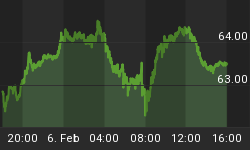Two lovers of the notion that inflation can cure everything that ails an economy recently squared off in a battle over who adores counterfeiting the most. Paul Krugman, who probably has a statue of Al Capone at his bedside, chided Ben Bernanke in a New York Times Magazine article for his unwillingness to raise the Fed's inflation target in order to reduce the unemployment rate. The recipient of the Nobel Prize in economics penned an article titled "Earth to Ben Bernanke" on April 24th. In it he encouraged Bernanke to embrace the idea that more money printing can save the world by writing, "Higher expected inflation would aid an economy."
Bernanke addressed Krugman's comments at last week's FOMC press conference. His dovish response directed towards Krugman's commentary was, "The question is, does it make sense to actively seek a higher inflation rate in order to achieve a slightly faster reduction in the unemployment rate...the view of the committee is that that would be very reckless." While it is commendable that Bernanke doesn't publicly admit he wants to send inflation higher than it already is; the question remains why he believes that higher inflation can cause even the slightest reduction in unemployment.
What strikes me the most is that neither the Nobel Prize winner nor the Chairman of the Federal Reserve had the sagacity to completely repudiate the idea that inflation can in any way reduce the unemployment rate. Even a cursory look at the data throughout economic history proves that inflation is a destroyer of jobs. All they would have to do is to look at the most salient periods of inflation that occurred over the last 40 years and see how negatively it affected the unemployment rate.
From 1971 (the year Nixon broke the gold window) through 1974, the annual percentage change on the Consumer Price Index (CPI) increased from 4.4% to 11.0%. According to Krugman and Bernanke, this should have sent the unemployment rate crashing. However, the unemployment rate increased from 6.1% at the end of 1971 to 7.2% in 1974. And since the unemployment rate is a lagging indicator, that figure increased even further to 8.2% in December of 1975.
In 1977 the CPI was 6.5% and it shot all the way up to 13.5% in 1980. Just as it did in the early part of the decade, the unemployment rate increased yet again to 7.2% in 1980 and hit 10.8% by the end of 1982! Finally, the other salient increase in the rate of inflation occurred between 1986 and 1990. The annual percentage change of inflation in '86 was 1.9;, that shot up to 5.4% in 1990. The unemployment rate started that period at 6.6% and climbed to 7.3% at the end of 1991.
Therefore, I have to ask our dear Fed Chairman and Nobel Prize winner where the evidence is that inflation causes people to find work. In reality, it's the exact opposite that occurs. Inflation robs the middle class of their purchasing power and sends them onto the government dole. Inflation also destroys investment in an economy because savers have no idea what interest rate is necessary to charge in order to profitably lend out their money over an extended period of time. And inflation causes tremendous economic imbalances, as capital is diverted into ephemeral asset bubbles instead of being allocated in a more viable manner.
If Krugman and Bernanke were correct in believing inflation has a positive influence on the workforce, Zimbabwe and Argentina would both be paragons of how to achieve full employment. The truth is that a high unemployment rate is the simply the result of a weak economy. And an economy can suffer through a recession while experiencing either inflation or deflation. But when an economy experiences a significant increase in the rate of inflation, it nearly always ends up with an unemployment rate that goes along for the ride. We can only hope that central bankers in the developed world assent to that principle very soon. Unfortunately, the ECB, BOJ and Fed continue to believe a positive rate of inflation must be maintained at all costs. That is one of the reasons why a high rate of unemployment has now become a structural condition in most of the developed world.















